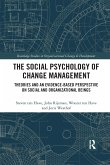Insecurity is an inevitable part of being human. Although life is insecure for every organism, humans alone are burdened by knowing that this is so. This ground-breaking volume features contributions by leading international researchers exploring the social psychology of insecurity and how existential, metaphysical, and social uncertainty influence human social behaviour.
Chapters in the book investigate the psychological origins of insecurity, evolutionary theorizing about the functions of insecurity, the motivational strategies people adopt to manage insecurity, self-regulation strategies, the role of insecurity in the formation and maintenance of social relationships, and the influence of insecurity and uncertainty on the organization of larger social systems and public affairs. The chapters also discuss how insecurity influences many areas of contemporary social life, highlighting the applied implications of this line of research. Topics covered include the role ofinsecurity in social communication, social judgments, decision-making, group identification, morality, interpersonal behaviour, relationships, attitudes, and many applied aspects of social life and politics where understanding the psychology of insecurity is of critical importance.
This accessible and engaging book will be of interest to students, researchers, and practitioners as a textbook or reference book in behavioural and social science fields, as well as to a broad spectrum of intelligent lay audiences seeking to understand one of the most intriguing issues that shapes human social life.
Chapters in the book investigate the psychological origins of insecurity, evolutionary theorizing about the functions of insecurity, the motivational strategies people adopt to manage insecurity, self-regulation strategies, the role of insecurity in the formation and maintenance of social relationships, and the influence of insecurity and uncertainty on the organization of larger social systems and public affairs. The chapters also discuss how insecurity influences many areas of contemporary social life, highlighting the applied implications of this line of research. Topics covered include the role ofinsecurity in social communication, social judgments, decision-making, group identification, morality, interpersonal behaviour, relationships, attitudes, and many applied aspects of social life and politics where understanding the psychology of insecurity is of critical importance.
This accessible and engaging book will be of interest to students, researchers, and practitioners as a textbook or reference book in behavioural and social science fields, as well as to a broad spectrum of intelligent lay audiences seeking to understand one of the most intriguing issues that shapes human social life.









